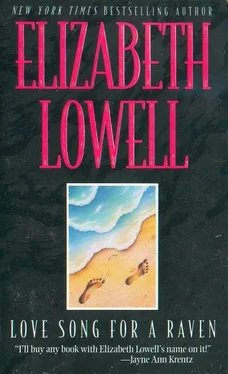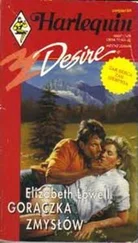
Elizabeth Lowell
Love Song For A Raven
The second book in the Angel, Hawk and Raven series, 1987
For Maiy Ben, who wanted Carlson to be happy.
The man called Raven came awake between one heartbeat and the next. He lay without moving, listening with the absolute stillness of someone whose life has depended many times on sensing shifts in wind and sea. Beneath him the Black Star tugged at its moorings in random motions, telling him that even within the shelter of the inlet, the water was choppy. Currents of air moaned around the boat with a wild, clean sound, the voice of a wind that hadn’t touched land for thousands of miles until it reached the Queen Charlotte Islands. Now that voice spoke to mountains rising steeply from the cold ocean, mountains clad in evergreens and ferns, mountains so rugged that man had chosen to challenge the untamed sea in cedar canoes rather than to walk the cloud-wreathed, primal land.
The elemental song of wind and mountain and sea were familiar to the man who lay motionless on the oversize bunk. Raven listened for a moment longer, filed away the fact that the storm had arrived twelve hours early and fell asleep once more.
Beyond the shallow crease of the inlet, the sea was a heaving blackness churned by a reckless wind. The promise of predawn light had been reduced to a vague gloaming that barely penetrated the lowering clouds. The only relief from the seamless gray came from the pale curves of an open rowboat struggling against the wind-whipped waves.
Steering the powerful outboard engine with one hand, Janna Moran kept the bow of the boat headed on a diagonal course into the wind and waves. With the other hand she bailed out the boat, using a plastic bleach bottle whose cap had been screwed on tightly and whose bottom had been cut entirely off. Normally the half-gallon bottle with its built-in handle grip did an excellent job of keeping the boat dry. Or reasonably dry. Nothing in the islands was really dry . The combination of the cold northern sea and the relatively warm Ku-roshio current made for nearly constant fog, mist, drizzle, rain and more rain.
Usually Janna enjoyed the liquid varieties of „Queen Charlotte sunshine,“ but not that morning. The wild predawn churning of water and wind had begun without warning, catching her out on the open sea. The storm that had been scheduled to arrive that evening had obviously picked up both speed and strength somewhere over the Pacific. Instead of the customary rain, brisk wind and choppy seas that had been predicted, the storm was shaping up to be a much more formidable affair.
Anxiously Janna scanned the coastline to her left. By narrowing her gray-green eyes against the wind, she could just make out the rugged wall of land rising from the dark sea. She made a soft sound of dismay as she saw that she was still well short of the opening of Totem Inlet. The last time she had looked, just before the clouds had closed down in the east, she had needed only fifteen more minutes of running time before she could turn and head into the calmer waters of the inlet. But the wind had shifted. Now both tide and wind were running heavily against her, and waves were breaking over the bow as fast as she could bail.
Even worse, the outboard motor had been acting up. At first it had been no more than hesitations in the mechanical heartbeat that were so tiny she thought she had imagined them. By the time she had passed the halfway point to the inlet’s safety, the hesitations had become noticeable, more ominous. The engine had stuttered twice in as many minutes, making her own heartbeat lurch.
Janna stared toward the coastline again, wondering if she dared go in closer to the land, shortening her distance to the inlet. The memory of huge waves battering against dark cliffs on either side of Totem Inlet’s opening made her reject that possibility. The course she had chosen was longer but it was also far safer.
The motor coughed, faded, caught and then died.
Suddenly the wind sounded very loud. With her heart wedging in her throat, Janna turned, braced herself on the bench seat and pulled on the starter cord with all her strength. The engine made healthy ripping noises but didn’t catch. She pulled again and again and felt an almost dizzying surge of relief when the motor finally beat steadily once more. Instantly she turned the bow back into the wind and cranked the speed up a notch or two. More water would come in over the gunwale at a higher speed, but she would also get to the inlet sooner.
For a few minutes Janna made good speed. Just as her heartbeat had settled down again, the motor died without warning. She dropped the bailing bottle, grabbed the starter cord and began pulling. The motor ripped, muttered and died. Janna yanked on the cord again and again. Each time she pulled, the engine stirred but didn’t fully awaken.
„Damn you, start!“
As though it had only been waiting for the proper encouragement, the motor ripped into life. Janna’s slim fingers wrapped around the handle again, feeding gas steadily as she steered once more into the wind and the waves. Sheets of wind-driven spray broke over her, sending streamers of cold water pouring over her yellow poncho. Most of the water drained off into the boat, but some of it inevitably worked beneath the poncho’s hood to slide chilly fingers down her spine and between her breasts. Inside the midcalf fisherman’s galoshes she wore, her feet were soaked. So were her legs from midthigh on down.
Janna bailed rapidly – not out of any hope of staying dry, but to decrease the weight of the boat so that it didn’t ride so low in the heaped waves. Water was heavier than it looked, as her left arm reminded her with each stroke of the half-gallon bleach bottle. Yet for every quart she threw back into the sea, the wind delivered more across her face.
The motor shuddered and stopped. Janna dropped the bailing bottle and pulled on the starter cord again and again. With each pull the motor made a harsh ripping noise but refused to catch. She threw a worried glance toward the coastline. It was closer. Too close. Enough light had seeped through the clouds so that she could see a distinct line of foam where breakers threw themselves at the feet of dark cliffs. There was no gap in the white line, nothing to indicate a safe place to moor short of Totem Inlet itself.
Janna squeezed the bulb leading from the gasoline reservoir to the motor. Liquid spurted invisibly. She could feel its resistance in the bulb beneath her palm. She wasn’t out of gas. Whatever was causing the outboard to fail wasn’t a lack of fuel. Grimly she yanked on the starting cord, putting everything she had into it.
Nothing happened.
The boat slewed sideways as a wave hit. Janna barely managed to stay aboard. Without the motor’s power, the boat was at the mercy of the wind and tide. Now she was sideways to the incoming waves and being shoved toward shore at a frighteningly swift pace. She pulled hard on the cord twice more, but nothing greeted her efforts, not even the familiar coughing snarl as the motor tried and failed to keep running.
Suddenly Janna knew that it was futile to waste her energy any longer. There was no more time for her to spend pulling on the starting cord of a dead motor. She scrambled off the rowboat’s stern seat and threw herself onto the middle seat. Working as quickly as her cold hands would allow, she unshipped the oars, jammed the pegs down into the oarlocks and began to row with all her strength. As she pulled on the oars, she brought the bow back around to meet the wind and waves. Immediately the boat began taking on less water.
Читать дальше













